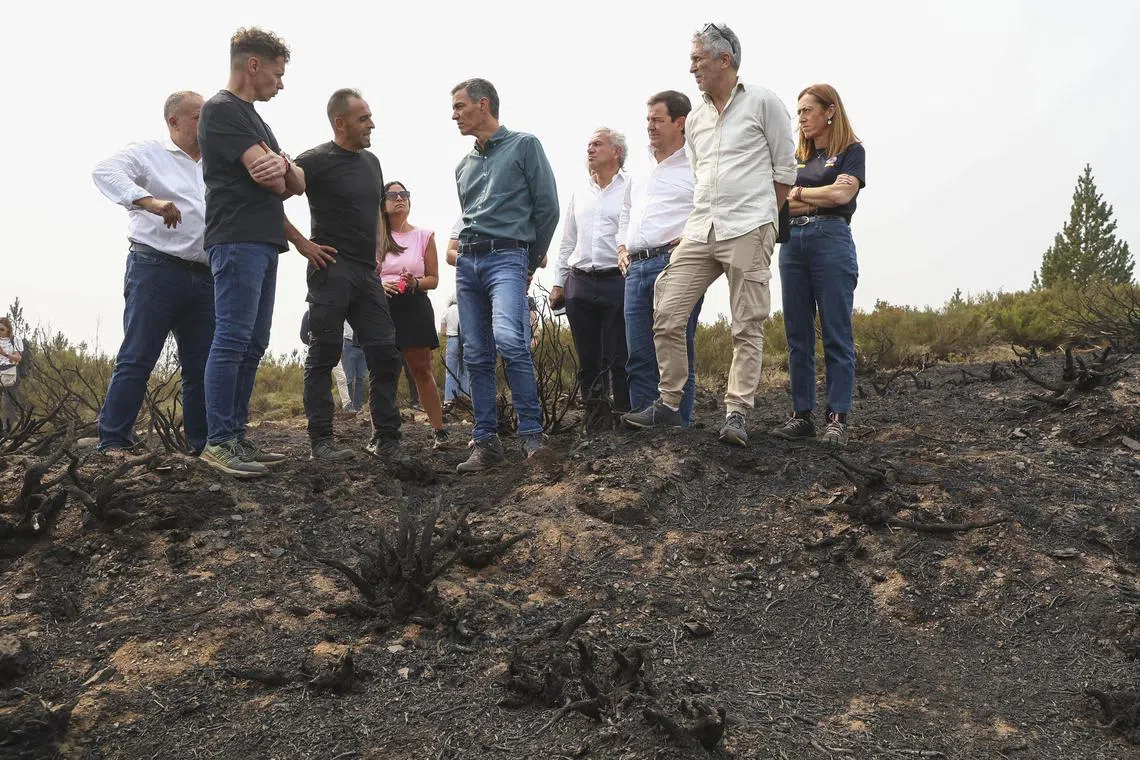Spain’s huge wildfires stabilising as cooler weather fuels hope the worst is over
Sign up now: Get ST's newsletters delivered to your inbox

A firefighter working to extinguish a forest fire in Spain's Galicia region on Aug 19.
PHOTO: EPA
GONDULFES, Spain – Wildfires raging in northern and western Spain have burned through nearly the same area in the past 24 hours as in all of 2024, although the end of a 16-day heatwave and expected rainfall have fanned hopes that an end may be in sight.
The fires have spread over the regions Camino de Santiago pilgrimage trail.
Data on Aug 19 from the European Forest Fire Information System (Effis) showed that the fires have burned vegetation on 38,000ha since Aug 18, just below 42,000ha during the whole of 2024.
But the national weather agency, which on Aug 18 declared the end of one of the longest heatwaves in the past five decades, now expects temperatures to fall and humidity to rise.
“The evolution is favourable, the teams are stabilising the fires,” Mr Alfonso Fernandez Manueco, the Castile and Leon regional leader, told reporters.
The region, Spain’s largest, is one of the worst hit by the blazes.
“If weather trends continue, we will be better tomorrow than today and better the day after tomorrow,” Mr Manueco said.
The weather agency said adverse conditions would remain in southern Spain, including in part of Extremadura.
So far in 2025, an estimated 382,600ha have burned in Spain – an area equivalent to the size of the island of Mallorca – according to the Effis. It is the largest area in records that go back to 2006 and more than four times the 2006 to 2024 average.

Spanish Prime Minister Pedro Sanchez (centre) visiting the scene of the fires on Aug 17.
PHOTO: EPA
Visiting the fires
Blaming the fires on the effects of climate change, he also said he would propose a plan in September to turn climate emergency policies into permanent state policies. He gave no details, but the authorities have been focusing on fire prevention and response planning.
“We’re seeing the climate emergency accelerate and worsen significantly, particularly in the Iberian Peninsula, each year,” he said.
Opposition leaders have said his proposal is a way to divert attention from his government’s poor handling of the fires.
Most of southern Europe is experiencing one of its worst wildfire seasons in two decades.
The Spanish army has deployed 3,400 troops and 50 aircraft to help firefighters, while the Czech Republic, Finland, France, Germany, Netherlands and Slovakia have sent hundreds of firefighters, vehicles and aircraft.
The Interior Ministry said that since June, 32 people have been arrested


